- Home
- James Herriot
All Things Wise and Wonderful Page 4
All Things Wise and Wonderful Read online
Page 4
As I sat down I decided to have one last try.
“Is this the tooth?” I asked, tapping the only possible suspect.
“It is indeed!” boomed The Butcher. That’s the one.”
“Ah well,” I said with a light laugh. “I’m sure I can explain. There’s been some mistake …”
“Yes … yes …” he murmured, filling the syringe before my eyes and sending a few playful spurts into the air.
There’s just a bit of enamel off it and Mr. Grover said …”
The WAAF suddenly wound the chair back and I found myself in the semi-prone position with the white bulk looming over me.
“You see,” I gasped desperately. “I need that tooth. It’s the one that holds my …”
A strong finger was on my gum and I felt the needle going in. I resigned myself to my fate.
When he had inserted the local the big man put the syringe down. “We’ll just give that a minute or two,” he said, and left the room.
As soon as the door closed behind him the WAAF tiptoed over to me.
“This feller’s loopy!” she whispered.
Half lying, I stared at her.
“Loopy …? What d’you mean?”
“Crackers! Round the bend! No idea how to pull teeth!”
“But … but … he’s a dentist isn’t he …?”
She pulled a wry face. “Thinks he is! But he hasn’t a clue!”
I had no time to explore this cheering information further because the door opened and the big man returned.
He seized a horrible pair of forceps and I closed my eyes as he started flexing his muscles.
I must admit I felt nothing. I knew he was twisting and tugging away up there but the local had mercifully done its job. I was telling myself that it would soon be over when I heard a sharp crack.
I opened my eyes. The Butcher was gazing disappointedly at my broken-off tooth in his forceps. The root was still in my gum.
Behind him the WAAF gave me a long “I told you so” nod. She was a pretty little thing, but I fear the libido of the young men she encountered in here would be at a low ebb.
“Oh!” The Butcher grunted and began to rummage in a metal box. It took me right back to the McDarroch days as he fished out one forceps after another, opened and shut them a few times then tried them on me.
But it was of no avail, and as the time passed I was the unwilling witness of the gradual transition from heartiness to silence, then to something like panic. The man was clearly whacked. He had no idea how to shift that root.
He must have been gouging for half an hour when an idea seemed to strike him. Pushing all the forceps to one side he almost ran from the room and reappeared shortly with a tray on which reposed a long chisel and a metal mallet.
At a sign from him the WAAF wound the chair back till I was completely horizontal. Seemingly familiar with the routine, she cradled my head in her arms in a practised manner and stood waiting.
This couldn’t be true, I thought as the man inserted the chisel into my mouth and poised the mallet; but all doubts were erased as the metal rod thudded against the remnants of my tooth and my head in turn shot back into the little WAAF’s bosom. And that was how it went on. I lost count of time as The Butcher banged away and the girl hung on grimly to my jerking skull.
The thought uppermost in my mind was that I had always wondered how young horses felt when I knocked wolf teeth out of them. Now I knew.
When it finally stopped I opened my eyes, and though by this time I was prepared for anything, I still felt slightly surprised to see The Butcher threading a needle with a length of suture silk. He was sweating and looking just a little desperate as he bent over me yet again.
“Just a couple of stitches,” he muttered hoarsely, and I closed my eyes again.
When I left the chair I felt very strange indeed. The assault on my cranium had made me dizzy and the sensation of the long ends of the stitches tickling my tongue was distinctly odd. I’m sure that when I came out of the room I was staggering, and instinctively I pawed at my mouth.
The first man I saw was Simkin. He was where I had left him but he looked different as he beckoned excitedly to me. I went over and he caught at my tunic with one hand.
“What d’yer think, mate?” he gasped. “They’ve changed me round and I’ve got to go into room four.” He gulped. “You looked bloody awful comin’ out there. What was it like?”
I looked at him. Maybe there was going to be a gleam of light this morning. I sank into the chair next to him and groaned.
“By God, you weren’t kidding! I’ve never met anybody like that—he’s half killed me. They don’t call him The Butcher for nothing!”
“Why … what … what did ’e do?”
“Nothing much. Just knocked my tooth out with a hammer and chisel, that’s all.”
“Garn! You’re ’avin’ me on!” Simkin made a ghastly attempt to smile.
“Word of honour,” I said. “Anyway, there’s the tray coming out now. Look for yourself.”
He stared at the WAAF carrying the dreadful implements and turned very pale.
“Oh blimey! What … what else did ’e do?”
I held my jaw for a moment. “Well he did something I’ve never seen before. He made such a great hole in my gum that he had to stitch me up afterwards.”
Simkin shook his head violently. “Naow, I’m not ’avin’ that! I don’t believe yer!”
“All right,” I said. “What do you think of this?”
I leaned forward, put my thumb under my lip and jerked it up to give him a close-up view of the long gash and the trailing blood-stained ends of the stitches.
He shrank away from me, lips trembling, eyes wide.
“Gawd!” he moaned. “Oh Gawd …!”
It was unfortunate that the WAAF chose that particular moment to call out “AC2 Simkin” piercingly from the doorway, because the poor fellow leaped as though a powerful electric current had passed through him. Then, head down, he trailed across the room. At the door he turned and gave me a last despairing look and I saw him no more.
This experience deepened my dread of the five fillings which awaited me. But I needn’t have worried; they were trivial things and were efficiently and painlessly dealt with by RAF dentists very different from The Butcher.
And yet, many years after the war had ended, the man from room four stretched out a long arm from the past and touched me on the shoulder. I began to feel something sharp coming through the roof of my mouth and went to Mr. Grover, who X-rayed me and showed me a pretty picture of that fateful root still there despite the hammer and chisel. He extracted it and the saga was ended.
The Butcher remained a vivid memory because, apart from my ordeal, I was constantly reminded of him by the dangerous wobbling of my pipe at the edge of that needless gap in my mouth.
But I did have a small solace. I finished my visit to room four with a parting shaft which gave me a little comfort. As I tottered away I paused and addressed the big man’s back as he prepared for his next victim.
“By the way,” I said. “I’ve knocked out a lot of teeth just like you did there.”
He turned and stared at me. “Really? Are you a dentist?”
“No,” I replied over my shoulder as I left ‘I’m a vet!”
CHAPTER 4
I LIKE WOMEN BETTER than men.
Mind you, I have nothing against men—after all, I am one myself—but in the RAF there were too many of them. Literally thousands, jostling, shouting, swearing; you couldn’t get away from them. Some of them became my friends and have remained so until the present day, but the sheer earthy mass of them made me realise how my few months of married life had changed me.
Women are gentler, softer, cleaner, altogether nicer things and I, who always considered myself one of the boys, had come to the surprising conclusion that the companion I wanted most was a woman.
My impression that I had been hurled into a coarser world was heightened at the b
eginning of each day, particularly one morning when I was on fire picket duty and had the sadistic pleasure of rattling the dustbin lids and shouting “Wakey-wakey!” along the corridors. It wasn’t the cursing and the obscene remarks which struck deepest, it was the extraordinary abdominal noises issuing from the dark rooms. They reminded me of my patient, Cedric, and in an instant I was back in Darrowby answering the telephone.
The voice at the other end was oddly hesitant.
“Mr. Herriot … I should be grateful if you would come and see my dog.” It was a woman, obviously upper class.
“Certainly. What’s the trouble?”
“Well … he … er … he seems to suffer from … a certain amount of flatus.”
“I beg your pardon?”
There was a long pause. “He has … excessive flatus.”
“In what way, exactly?”
“Well … I suppose you’d describe it as … windiness.” The voice had begun to tremble.
I thought I could see a gleam of light “You mean his stomach …?”
“No, not his stomach. He passes … er … a considerable quantity of … wind from his … his …” A note of desperation had crept in.
“Ah, yes!” All became suddenly clear. “I quite understand. But that doesn’t sound very serious. Is he ill?”
“No, he’s very fit in other ways.”
“Well then, do you think it’s necessary for me to see him?”
“Oh yes, indeed, Mr. Herriot. I wish you would come as soon as possible. It has become quite … quite a problem.”
“All right,” I said. “I’ll look in this morning. Can I have your name and address, please?”
“It’s Mrs. Rumney, The Laurels.”
The Laurels was a very nice house on the edge of the town standing back from the road in a large garden. Mrs. Rumney herself let me in and I felt a shock of surprise at my first sight of her. It wasn’t just that she was strikingly beautiful; there was an unworldly air about her. She would be around forty but had the appearance of a heroine in a Victorian novel—tall, willowy, ethereal. And I could understand immediately her hesitation on the ’phone. Everything about her suggested fastidiousness and delicacy.
“Cedric is in the kitchen,” she said. “I’ll take you through.”
I had another surprise when I saw Cedric. An enormous Boxer hurled himself on me in delight, clawing at my chest with the biggest, horniest feet I had seen for a long time. I tried to fight him off but he kept at me, panting ecstatically into my face and wagging his entire rear end.
“Sit down, boy!” the lady said sharply, then, as Cedric took absolutely no notice, she turned to me nervously. “He’s so friendly.”
“Yes,” I said breathlessly, “I can see that.” I finally managed to push the huge animal away and backed into a corner for safety. “How often does this … excessive flatus occur?”
As if in reply an almost palpable sulphurous wave arose from the dog and eddied around me. It appeared that the excitement of seeing me had activated Cedric’s weakness. I was up against the wall and unable to obey my first instinct to run for cover, so I held my hand over my face for a few moments before speaking. “Is that what you meant?”
Mrs. Rumney waved a lace handkerchief under her nose and the faintest flush crept into the pallor of her cheeks.
“Yes,” she replied almost inaudibly. “Yes … that is it.”
“Oh well,” I said briskly. “There’s nothing to worry about. Let’s go into the other room and we’ll have a word about his diet and a few other things.”
It turned out that Cedric was getting rather a lot of meat and I drew up a little chart cutting down the protein and adding extra carbohydrates. I prescribed a kaolin antacid mixture to be given night and morning and left the house in a confident frame of mind.
It was one of those trivial things and I had entirely forgotten it when Mrs. Rumney ’phoned again. I’m afraid Cedric is no better, Mr. Herriot.”
“Oh I’m sorry to hear that. He’s still … er … still … yes … yes …” I spent a few moments in thought. “I tell you what—I don’t think I can do any more by seeing him at the moment but I think you should cut out his meat completely for a week or two. Keep him on biscuits and brown bread rusked in the oven. Try him with that and vegetables and I’ll give you some powder to mix in his food. Perhaps you’d call round for it.”
The powder was a pretty strong absorbent mixture and I felt sure it would do the trick, but a week later Mrs. Rumney was on the ’phone again.
“There’s absolutely no improvement Mr. Herriot.” The tremble was back in her voice. “I … I do wish you’d come and see him again.”
I couldn’t see much point in viewing this perfectly healthy animal again but I promised to call. I had a busy day and it was after six o’clock before I got round to The Laurels. There were several cars in the drive and when I went into the house I saw that Mrs. Rumney had a few people in for drinks; people like herself—upper class and of obvious refinement. In fact I felt rather a lout in my working clothes among the elegant gathering.
Mrs. Rumney was about to lead me through to the kitchen when the door burst open and Cedric bounded delightedly into the midst of the company. Within seconds an aesthetic-looking gentleman was frantically beating off the attack as the great feet ripped down his waistcoat. He got away at the cost of a couple of buttons and the Boxer turned his attention to one of the ladies. She was in imminent danger of losing her dress when I pulled the dog off her.
Pandemonium broke out in the graceful room. The hostess’s plaintive appeals rang out above the cries of alarm as the big dog charged around, but very soon I realised that a more insidious element had crept into the situation. The atmosphere in the room became rapidly charged with an unmistakable effluvium and it was clear that Cedric’s unfortunate malady had reasserted itself.
I did my best to shepherd the animal out of the room but he didn’t seem to know the meaning of obedience and I chased him in vain. And as the embarrassing minutes ticked away I began to realise for the first time the enormity of the problem which confronted Mrs. Rumney. Most dogs break wind occasionally but Cedric was different; he did it all the time. And while his silent emanations were perhaps more treacherous there was no doubt that the audible ones were painfully distressing in a company like this.
Cedric made it worse, because at each rasping expulsion he would look round enquiringly at his back end then gambol about the room as though the fugitive zephyr was clearly visible to him and he was determined to corner it.
It seemed a year before I got him out of there. Mrs. Rumney held the door wide as I finally managed to steer him towards it but the big dog wasn’t finished yet. On his way out he cocked a leg swiftly and directed a powerful jet against an immaculate trouser leg.
After that night I threw myself into the struggle on Mrs. Rumney’s behalf. I felt she desperately needed my help, and I made frequent visits and tried innumerable remedies. I consulted my colleague Siegfried on the problem and he suggested a diet of charcoal biscuits. Cedric ate them in vast quantities and with evident enjoyment but they, like everything else, made not the slightest difference to his condition.
And all the time I pondered upon the enigma of Mrs. Rumney. She had lived in Darrowby for several years but the townsfolk knew little about her. It was a matter of debate whether she was a widow or separated from her husband. But I was not interested in such things; the biggest mystery to me was how she ever got involved with a dog like Cedric.
It was difficult to think of any animal less suited to her personality. Apart from his regrettable affliction he was in every way the opposite to herself; a great thick-headed rumbustious extrovert totally out of place in her gracious menage. I never did find out how they came together but on my visits I found that Cedric had one admirer at least.
He was Con Fenton, a retired farm worker who did a bit of jobbing gardening and spent an average of three days a week at The Laurels. The Boxer romped down th
e drive after me as I was leaving and the old man looked at him with undisguised admiration.
“By gaw,” he said. “He’s a fine dog, is that!”
“Yes, he is, Con. He’s a good chap, really.” And I meant it. You couldn’t help liking Cedric when you got to know him. He was utterly amiable and without vice and he gave off a constant aura not merely of noxious vapours but of bonhomie. When he tore off people’s buttons or sprinkled their trousers he did it in a spirit of the purest amity.
“Just look at them limbs!” breathed Con, staring rapturously at the dog’s muscular thighs. “By heck, ’e can jump ower that gate as if it weren’t there. He’s what ah call a dog!”
As he spoke it struck me that Cedric would be likely to appeal to him because he was very like the Boxer himself; not over-burdened with brains, built like an ox with powerful shoulders and a big constantly-grinning face—they were two of a kind.
“Aye, ah allus likes it when t’missus lets him out in t’garden,” Con went on. He always spoke in a peculiar snuffling manner. “He’s grand company.”
I looked at him narrowly. No, he wouldn’t be likely to notice Cedric’s complaint since he always saw him out of doors.
On my way back to the surgery I brooded on the fact that I was achieving absolutely nothing with my treatment. And though it seemed ridiculous to worry about a case like this, there was no doubt the thing had begun to prey on my mind. In fact I began to transmit my anxieties to Siegfried. As I got out of the car he was coming down the steps of Skeldale House and he put a hand on my arm.
“You’ve been to The Laurels, James? Tell me,” he queried solicitously, “how is your farting Boxer today?”
“Still at it, I’m afraid,” I replied, and my colleague shook his head in commiseration.
We were both defeated. Maybe if chlorophyll tablets had been available in those days they might have helped but as it was I had tried everything. It seemed certain that nothing would alter the situation. And it wouldn’t have been so bad if the owner had been anybody else but Mrs. Rumney; I found that even discussing the thing with her had become almost unbearable.

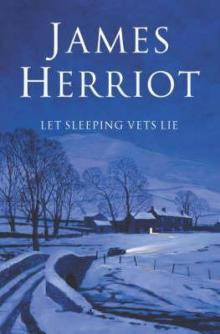 Let Sleeping Vets Lie
Let Sleeping Vets Lie James Herriot's Dog Stories
James Herriot's Dog Stories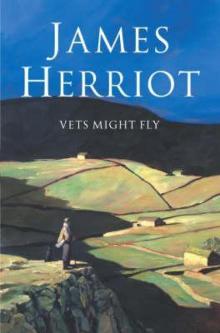 Vets Might Fly
Vets Might Fly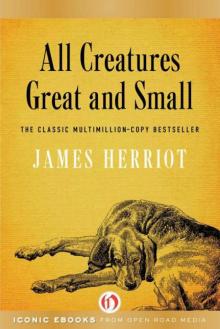 All Creatures Great and Small
All Creatures Great and Small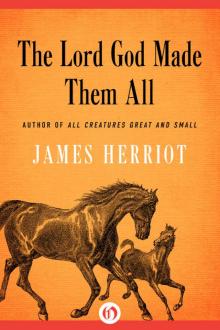 The Lord God Made Them All
The Lord God Made Them All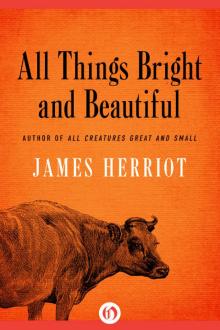 All Things Bright and Beautiful
All Things Bright and Beautiful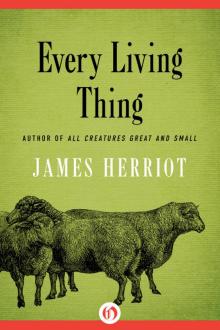 Every Living Thing
Every Living Thing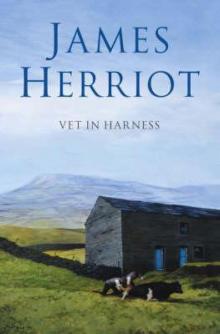 Vet in Harness
Vet in Harness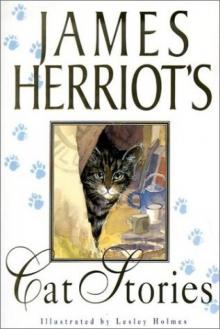 James Herriot's Cat Stories
James Herriot's Cat Stories Vet in a Spin
Vet in a Spin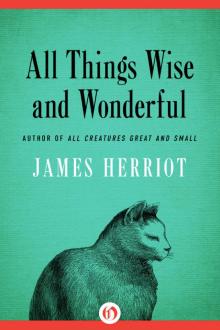 All Things Wise and Wonderful
All Things Wise and Wonderful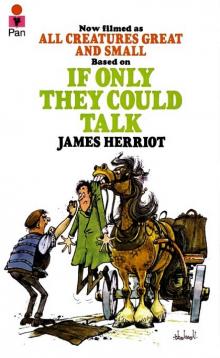 If Only They Could Talk
If Only They Could Talk